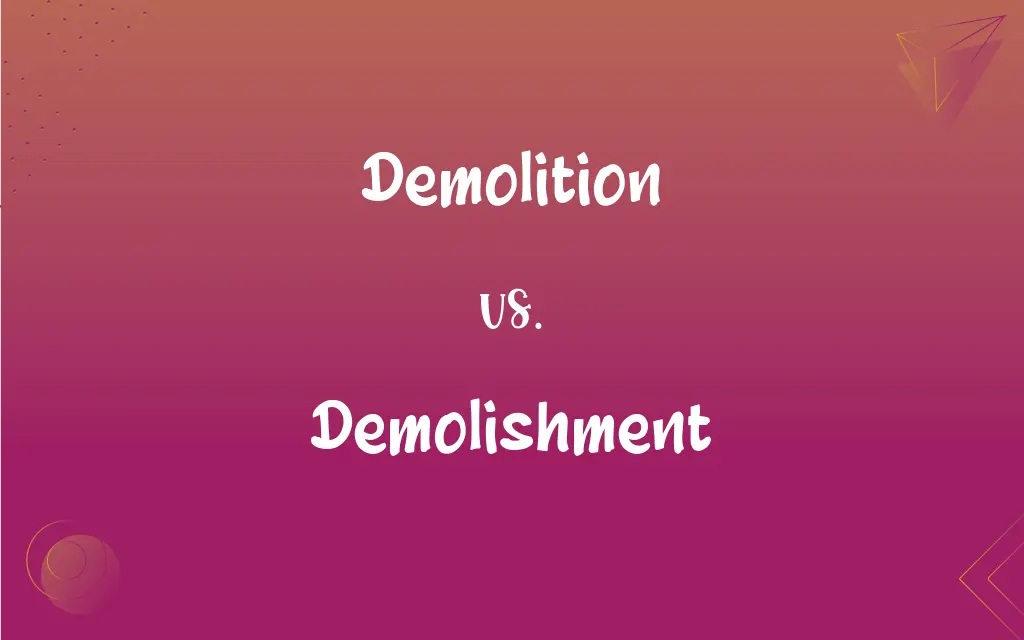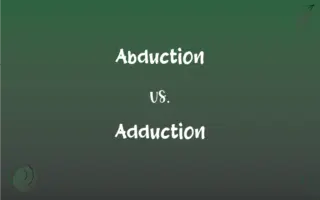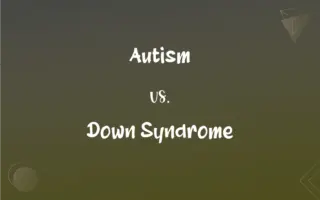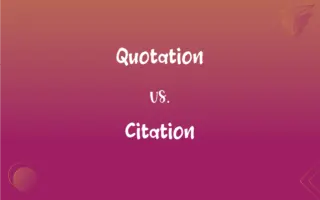Demolition vs. Demolishment: What's the Difference?
Edited by Harlon Moss || By Janet White || Updated on October 4, 2023
Demolition refers to the act of destroying or tearing down structures, while demolishment, although synonymous in a general sense, is less commonly used in formal English and may not be recognized in some dictionaries.

Key Differences
Demolition carries a clear-cut definition: it's the act of demolishing, or systematic destruction of a building or structure. Typically, the term “demolition” is employed in various contexts, including construction, linguistics, and even casual communication. Demolishment, while understood, may be seen as a less conventional term despite its similar meaning.
In practical and occupational contexts, particularly within construction, demolition is the preferred term. It's universally understood and is leveraged in official documents, communications, and legalities. Meanwhile, demolishment, despite offering semantic similarity, might not be welcomed with the same occupational ubiquity.
From a linguistic standpoint, demolition seems to be more widely accepted and utilized in the English language. This is discernible in journalistic writing, academic research, and professional documents, where demolition is leveraged to describe the intentional deconstruction of structures. Demolishment, while communicatively valid, doesn’t share this universal application.
Diving into colloquial usage, demolition penetrates everyday language as a clear and concise descriptor of intentional structural deconstruction. On the other hand, demolishment, although it could theoretically be used interchangeably in casual conversation, might be perceived as linguistically awkward or unusual due to its less frequent usage.
In terms of grammatical construction and etymology, demolition stems from the French démolition, which is derived from the Latin demolitionem—relating to the act of tearing down. Demolishment, though theoretically following a correct English morphological pattern (like payment or shipment), doesn’t enjoy the same historical or etymological utilization as its counterpart.
ADVERTISEMENT
Comparison Chart
Common Usage
Widely used in various contexts.
Less commonly used in formal contexts.
Linguistic Acceptance
Accepted and utilized universally.
May not be recognized in some dictionaries
Formality
Formal and informally acceptable.
Generally considered less formal.
Industry Application
Standard term in construction industry.
Rarely used in industry contexts.
Etymological Foundation
Has clear French and Latin roots.
Lacks a strong etymological foundation.
ADVERTISEMENT
Demolition and Demolishment Definitions
Demolition
Demolition refers to the intentional destruction of buildings.
The demolition of the old factory will take place next week.
Demolishment
Demolishment implies a breakdown or destruction.
The storm resulted in the demolishment of several houses.
Demolition
Demolition can imply a controlled, planned destruction.
The demolition was carefully planned to ensure no one was hurt.
Demolishment
Demolishment may suggest a collapse or fall.
The demolishment of prices in the market was unexpected.
Demolition
Demolition is the act of destroying to make way for new structures.
The demolition allowed for the construction of a new skyscraper.
Demolishment
Demolishment can denote the act of tearing down structures.
The old building faced demolishment to build a new mall.
Demolition
Demolition may signify the deconstruction of ideologies.
The book describes the demolition of traditional beliefs.
Demolishment
Demolishment might involve undoing or ruining something.
The demolishment of their plan was quite strategic.
Demolition
Demolition might refer to reduction or collapse.
The stock market experienced a demolition of values.
Demolishment
Demolishment can signify a decline or degradation.
His career faced demolishment after the scandal.
Demolition
The act or process of wrecking or destroying, especially destruction by explosives.
Demolishment
(archaic) demolition
Demolition
Demolitions Explosives, especially when designed or used as weapons.
Demolishment
Demolition.
Demolition
The process of demolishing or destroying buildings or other structures.
Demolition
The act of overthrowing, pulling down, or destroying a pile or structure; destruction by violence; utter overthrow; - opposed to construction; as, the demolition of a house, of military works, of a town, or of hopes.
Demolition
An event (or the result of an event) that completely destroys something
Demolition
The act of demolishing
FAQs
Is "Demolishment" a valid English word?
"Demolishment" is understood but is less common and may not be accepted in formal English or recognized in some dictionaries.
Is "Demolition" used in specific industries?
Yes, "demolition" is a standard term in construction and related industries for describing the deconstruction of buildings.
What is the primary meaning of "Demolition"?
"Demolition" primarily refers to the deliberate act of tearing down or destroying structures.
Is "Demolishment" a newer English word?
It's not notably newer but is less established and recognized than "demolition" in English usage.
Can "Demolition" refer to non-physical destruction?
Yes, "demolition" can metaphorically refer to the dismantling of ideas or systems, not just physical structures.
Can "Demolition" be used in various grammatical structures?
Yes, "demolition" can be used as a noun in various grammatical contexts, being versatile in speech and writing.
Can "Demolition" and "Demolishment" be used interchangeably?
While they convey similar meanings, "demolition" is widely accepted and used, whereas "demolishment" is less standard and common.
Are there synonyms for "Demolition"?
Yes, synonyms include "destruction", "razing", and occasionally "demolishment", despite its less frequent usage.
What is the etymological origin of "Demolition"?
"Demolition" stems from the French "démolition" and Latin "demolitionem", relating to tearing down.
How is "Demolishment" typically used?
"Demolishment" might be used in informal contexts or conversation to imply the act of demolishing, though it's less standard.
Which term is preferred in academic and professional writing?
"Demolition" is generally preferred in academic and professional documents due to its universal acceptance and usage.
Does "Demolishment" have related adjectives?
While "demolishing" might be used, standard adjectives directly related to "demolishment" are not common.
Can "Demolishment" be used to describe political or economic decline?
Theoretically, it can, but "demolition" or other synonyms are usually chosen for describing metaphorical destruction in these contexts.
What general advice is there for using "Demolition" vs. "Demolishment"?
Use "demolition" for broad and accepted communication in various contexts, and "demolishment" cautiously, recognizing it may be viewed as non-standard.
Which term, "Demolition" or "Demolishment", is globally understood?
"Demolition" is globally understood and utilized in various international contexts and languages.
Does "Demolishment" have metaphorical applications?
It could, though it's rarely used in metaphorical contexts due to its limited acceptance and usage in the language.
Is "Demolishment" recognized in major dictionaries?
Some dictionaries might recognize "demolishment", but many will not, due to its irregular usage.
What are related adjectives for "Demolition"?
Related adjectives include "destructive" and "demolitory".
How does popular media use the term "Demolition"?
"Demolition" is widely used in media to describe the intentional destruction of structures or metaphorical collapse of concepts.
How is "Demolition" used in legal contexts?
In legal terms, "demolition" refers to the lawful deconstruction of buildings, often involving permits and regulations.
About Author
Written by
Janet WhiteJanet White has been an esteemed writer and blogger for Difference Wiki. Holding a Master's degree in Science and Medical Journalism from the prestigious Boston University, she has consistently demonstrated her expertise and passion for her field. When she's not immersed in her work, Janet relishes her time exercising, delving into a good book, and cherishing moments with friends and family.
Edited by
Harlon MossHarlon is a seasoned quality moderator and accomplished content writer for Difference Wiki. An alumnus of the prestigious University of California, he earned his degree in Computer Science. Leveraging his academic background, Harlon brings a meticulous and informed perspective to his work, ensuring content accuracy and excellence.









































































